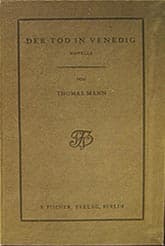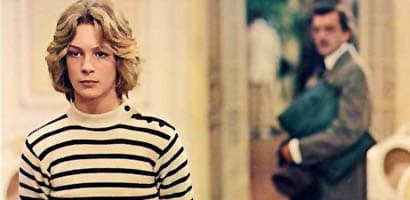Death in Venice
Critique • Quotes • Translations • At the movies
 First edition
First editionOriginal title
Der Tod in Venedig
First publication
1912
Literature form
Novella
Genres
Literary
Writing language
German
Author's country
Germany
Length
Approx. 20,000 words

The androgynous Tadzio is always just out of reach for repressed Aschenbach in Death in Venice.
The inner struggle to feel
Death in Venice (1971): Originally Morte a Venezia; film, 130 minutes; director Luchino Visconti; writers Visconti, Nicola Badalucco; featuring Dirk Bogarde, Björn Andresen
Death in Venice seems an impossible novel to adapt for the visual medium of film. Yet Italian director Luchino Visconti not only attempted it but made a film almost as great as the book.
To a large degree he did it by remaining faithful to the novel, which depicts an intellectual's inner struggle between striving for purity and sinking into sensuality. But how he did it was not to show the intellectual, Aschenbach, thinking deep thoughts, nor to dramatize his fantasy life—as lesser directors might have.
Rather he found cinematic equivalents of those interior ideas. His cameras lingeringly explore the seashore resort, the decaying city and Aschenbach's fellow vacationers, all the while keeping a distance from them. I'm not even sure how he does it, but somehow he puts across visually how alienated the man is from the tangible world. And how adolescent Tadzio—with little more than a glance or two—rekindles a passion in him. A passion not for an unattainable young man but a passion to connect with something he'd lost some years ago.
Yes, there are long scenes in which nothing much happens, long shots of sand and water and crumbling stone buildings. Almost a parody of how North Americans sometimes think of European films.
But these scenes are not boring, as they set up the same ambivalence within us as Aschenbach feels. Death in Venice is not slow in order to put us to sleep but slow to let us savour the feelings.
Trailer for 1971 adaptation of Death in Venice.
A few factual changes from the book are made. Aschenbach is no longer an academic but a composer, which allows flashbacks of him at work with music and lets him try to create even as he sits on the beach—in his white suit, tie and hat, under a canvas awning. One brilliant touch is having the middle-aged man attend a local barber to have his hair, eyebrows and mustache died to make him look younger in his ten-steps-behind pursuit of Tadzio. This leads to a particularly pathetic moment when the dye trickles down his face while he's sunbathing.
So far I haven't said anything that I think would convince someone to check out this film. It all sounds rather static. But it really is something to experience.
The acting of Dirk Bogarde is fascinating, given such a repressed character to play—probably the highlight of the career of the Dutch-British actor (who is to become an acclaimed novelist himself). Bogarde is said to have based his portrayal on the composer Gustav Mahler, whose music is used throughout and perfectly complements the visuals.
Young Swedish actor Björn Andresen has the perfect androgynous look for the love object and very few lines. He was so effective though that his acting career was just about ruined by typecasting forever afterwards.
We're glad Aschenbach doesn't live long enough to see the inevitable decay of his own forever-young muse.
— Eric
Critique • Quotes • Translations • At the movies

